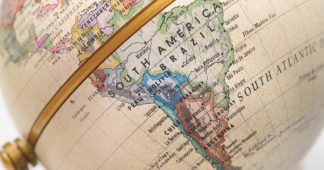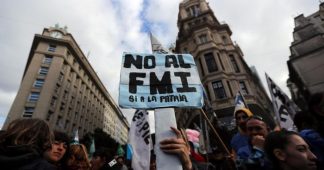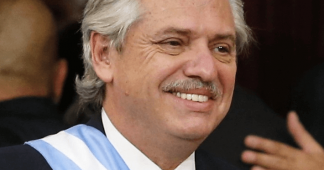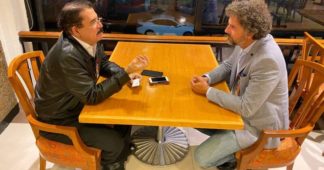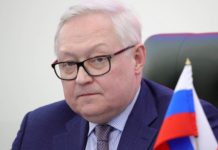By Facundo Escobar
01/12/2022
On January 7, the XXII Meeting of Foreign Ministers of CELAC (Community of Latin American and Caribbean States) was held in Buenos Aires. After the Mexico pro tempore presidency, in a new turn, Argentina will seek to keep giving life to an organism created under the influence of the integrative anti-imperialist trend led by Hugo Chávez in 2010. At that time, this novel and bold proposal was part of a high-impact strategic maneuver, which had been accumulating experience since the end of the 20th century. Today, however, it seems to have faded.
The continent has been undergoing a post-Chávez political reorganization era. Dependency relationships persist and are strong. There is no regional popular leadership. Conservatives, liberals and reactionaries can´t grow much. The masses are still rebellious and looking for a path. The situation is hotly contested at any corner. Along with this, a new phase of capitalism crisis has unfolded, negatively impacting the continent. And finally, the pandemic has exacerbated structural problems such as poverty, inflation, insecurity and inequality.
The challenges are enormous. The tone at the summit was of low intensity. Knowing that we move in a territory where the US hegemony is assertive, will the mediating and conciliatory positions –avoiding confrontation– lead to the development of the integrative experience? What could CELAC do without the background composed by the organizations that preceded it, and that in effect gave life to concrete integration, for example UNASUR or ALBA, even MERCOSUR? All of them are stagnant nowadays.
Trajectory and projection
The CELAC began operating after a Caracas meeting in December 2011. The first official summit was held in Santiago de Chile (January 2013), as a result of the convergence between the Summit of Latin America and the Caribbean on Integration and Development (CALC) and the Rio Group. Today it integrates 33 countries of the continent, except the US and Canada. Brazil has suspended its participation since the establishment of the Bolsonaro government.
The organism contains a high degree of contradictions, given the diversity of the countries that comprise it, their political positions, their distinct economic and military power, aspirations, potentials, and the type of internal conflicts that each one faces.
CELAC remains the best platform to settle differences without external interference. However, it expresses a complex and contradictory set. The Vice Minister of Multilateral Affairs of Colombia, María Carmelina Londoño, stated this clearly during the meeting in Buenos Aires. The Colombian representative argued that her country “rejects statements such as the one that has been made repeatedly in recent months, indicating that strengthening CELAC goes along the lines of burying the OAS. We will never support that possibility, which would seem to us a huge mistake”. She called instead for the integration of the continent with Canada and the US.
The new CELAC cycle is launched with low intensity. Argentine President Alberto Fernández and Foreign Minister Santiago Cafiero marked a contrast with the previous declarations of López Obrador. Fernández said that CELAC does not seek to oppose anyone, in allusion to what the first Mexican president said. López Obrador had proposed to build an organization that is “truly autonomous” and “nobody’s lackey” to replace the OAS
Cafiero proposed “to put aside political differences and work together to solve the problems that afflict the most unequal area in the world.” That is an incontestable value. And the CELAC must remain and strengthen itself as a forum where all the member states participate in the discussion. Let us remember that Venezuela and Cuba were expelled from the OAS, and Nicaragua may shortly follow that path. That is why one of its most relevant objectives is to sustain an inclusive dialogue, without interference, seeking to articulate consensus. It is a forum of slow development, where different objectives, multiple interests and divergent maneuvers coexist.
But meanwhile, we must keep in mind the OAS will persist in its interventionist nature, with high firepower, backed by the US. Washington placed its pawn in the Secretary General in 2015 (Almagro) and since then caused serious political problems in several countries of the region, precisely those that hold solid anti-imperialist positions. The OAS is undoubtedly an instrument of US foreign policy that has been very effective, and explains, in its own history, the history of US foreign policy for the continent since the beginning of the liberal post-second war order. Latin America and the Caribbean became a vital territory for the US and remain so today. Given the planetary rearrangement that is already underway, the US is supposed to be preparing an action plan, if it is not ready or even underway. We cannot assume that the US will decide to give up hegemony.
CELAC 2022
The Minister of Foreign Affairs, International Trade and Worship of Argentina, Santiago Cafiero, and the Secretary of Foreign Affairs of Mexico, Marcelo Ebrard, who offered a report on the achievements of the Pro Tempore Presidency of Mexico during the 2020-2021, conducted the inauguration in Buenos Aires. Ebrard highlighted the revitalization of CELAC as the most important mechanism for dialogue and political agreement in the region, as well as the articulation of the regional health strategy carried out against COVID-19, and the establishment of the Latin American and Caribbean Space Agency (ALCE). Subsequently, representatives of the CELAC Member States supported Argentina by consensus to assume the Pro Tempore Presidency during the year 2022.
In his speech, Cafiero thanked for the support of the member states regarding the Argentine claim in the negotiation with IMF and the sovereignty of the Malvinas Islands. He proposed an open agenda around 15 items: 1. inclusive post-covid-19 economic recovery; 2. Latin American and Caribbean health strategy; 3. space cooperation; 4. science, technology and innovation for social inclusion; 5. comprehensive disaster risk management; 6. education; 7. Institutional strengthening and the CELAC agenda against corruption; 8. food security; 9. dialogue with extra-regional partners; 10. integration of Latin American and Caribbean infrastructure; 11. environmental cooperation; 12. development and improvement of the operation of CELAC; 13. improvement of the situation and condition of women in member countries; 14. digital transformation and cooperation; 15. culture.
How much of all this can be done in one year? What, of all this, will have continuity in the following cycle? That is why, above all, it is necessary to build integration that operates at lower levels. Because there, confrontation of interests and strategies takes place and are resolved day to day, without solution of continuity. There is where reality changes. What is the situation in this regard? For instance, how to contain and respond to the crisis in Haiti? How to end Washington’s oppression of Cuba? What specific actions are being taken to combat drug trafficking? In Latin América and Caribbean, shouldn’t integration processes be the place from which to respond? After all, we are entering the era of multipolarity. Which are the economic and military positions on which progress should be achieved, if we understand that we are entering in that historical phase? What alternative financial frameworks are being established as regional integration? Unfortunately, the answers appear to be negative, and no solid figures appear on the horizon. Alternatives and solid pathways could be found –we say it again– in the revitalization and of course, conversion, of recent experience, in the deployment of a network, a varied spectrum of concrete integration processes with strategic sense adequate to the current level of development of capitalism.
US and China
Biden notes with concern that several of the CELAC members see the People’s Republic of China as a commercial and geopolitical ally, and through CELAC it seems that this kind of relationships are being channeled. The Xi Jinping government is forging alliances on the continent that cause misgivings in the US. The Argentine Foreign Minister signed a CELAC-China Joint Action Plan on sensitive issues that may affect US interests, especially regarding security and technology such as 5G. Point 1 of the agreement (“political and security cooperation”) proposes joint actions against “manifestations of transnational organized crime, illicit arms trafficking and illicit financial flows and to address the illicit production and trafficking of narcotic drugs and psychotropic substances”, the non-proliferation of weapons of mass destruction, measures against cybercrime. The text highlights the “Global Initiative on Data Security presented by China”, supported by Nicolás Maduro and developed after the US applied some restrictions to Chinese platforms such as TikTok, WeChat or Huawei, on the grounds that they could pose a danger to national security
In relation to Huawei and its 5G project, criticized by Washington, the point called “industry and information technology” includes “strengthening mutually beneficial cooperation between governments, companies and research institutions in digital infrastructure, telecommunications equipment, 5G, big data, cloud computing, artificial intelligence”. Juan González, advisor for Latin America to the Biden government, had stated that for Washington Huawei is affiliated with the Chinese government, “and its expansion in the region has implications in terms of Chinese intelligence but also pressure that China can exert.”
Cuba, Nicaragua, Venezuela
The foreign ministers Denis Moncada (Nicaragua), Félix Plasencia (Venezuela), and Bruno Rodríguez (Cuba) brought a different tone to the conversation. They denounced that the US government is carrying out coercive and unilateral measures against these countries, over which Washington maintains blockades and persecutions. Although they presented their specific own cases, those issues are undoubtedly crucial political battles for the continent. It is sufficient to imagine what the future of the regional balance would be if a pro-US right wing government took office in Venezuela tomorrow.
Moncada highlighted CELAC “in its leading role to strengthen unity in diversity. Unconditional unit that does not admit interventions or interference”. He condemned the “infamous and criminal US imperialist blockade” against Cuba, called for the cessation of all “illegal, unilateral and aggressive” measures that violate human rights in Cuba, Venezuela and Nicaragua, and demanded “the end of all imperialist aggressions that generate more vulnerability and poverty in a world that we must make fair, harmonious, fraternal, supportive and complementary”.
The Venezuelan Foreign Minister agreed with his Nicaraguan colleague in condemning the coercive measures coming from Washington and called for “strengthening multilateralism” of the member states. He argued that “It is incomprehensible that, at the present time, in the current global situation, there is a resurgence of unilateral sanctions and blockade against brother countries.” Plasencia remembered that his country is subject to “a blockade and a permanent economic, commercial and financial persecution.” He also reiterated the Caracas proposal to create a general secretariat of the CELAC, in order to “further stimulate the exchange between all countries in the region.”
For his part, Cuban Foreign Minister Bruno Rodríguez said that the organization must remain a “genuinely Latin American and Caribbean mechanism for political agreement” and asked to work as a “united and supportive region that can defend its interests with one voice its interests of peace, independence, sovereign equality, sustainable development and social justice”. He distinguished the solidarity of the member countries in the face of the blockade during the pandemic of coronavirus.
CELAC, must maintain the conciliatory tone, given its nature and the very broad objectives set from its origin, the diversity of agendas and the heterogeneity of its components. But without the development of other integration experiences, with stronger political definitions, with immediate effectiveness and specificity, CELAC will not be able to meet those laudable goals. It is necessary to rebuild new and concrete integration based on recent experience and give continuity. CELAC, as a tension diffuser, or used as a negotiating instrument, will be vain hope and disappointment, while it could contribute to slowly wearing down Our American identity. The regional integration process with autonomy and independence from the great global powers can only be reinforced while dependency is gradually demolished. Strategy must move in this direction if reality is to be transformed.
* Facundo Escobar is an argentinian anthropologist, journalist, researcher and International Relations and Political History Professor at National University of La Plata (UNLP), Buenos Aires, Argentina.
Published at uwidata.com
We remind our readers that publication of articles on our site does not mean that we agree with what is written. Our policy is to publish anything which we consider of interest, so as to assist our readers in forming their opinions. Sometimes we even publish articles with which we totally disagree, since we believe it is important for our readers to be informed on as wide a spectrum of views as possible.
